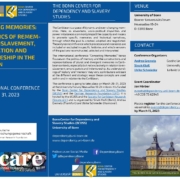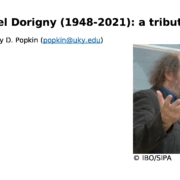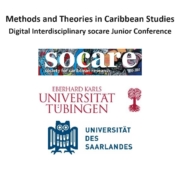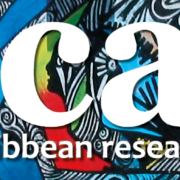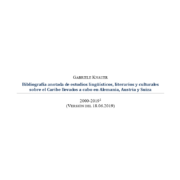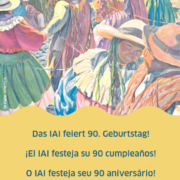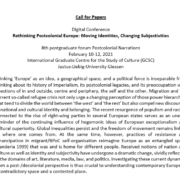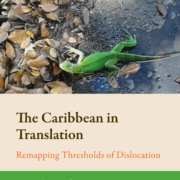Socare Symposium / Junior Konferenz – Open Call
Das nächste Socare Symposium / Junior-Konferenz wird von Donnerstag 28. bis Samstag 30. Oktober 2021 als digitale Konferenz stattfinden.
Die Bewerbungsphase läuft bis zum 31. Juli; der Call for Participation ist auf dieser Seite zu finden.
Wir freuen uns auf Ihre Bewerbung!
XVII. Socare-Tagung: Programm veröffentlicht
Das Programm für die digitale Internationale Konferenz der Gesellschaft für Karibikforschung (Socare) mit dem Titel „Between mobilities and demarcations of boundaries: Education and the politics of education in the Caribbean – Entre mobilités et démarcations de frontières : Éducation et politiques éducatives dans les Caraïbes – Entre movilidades y demarcaciones de fronteras: Educación y políticas educativas en el Caribe“ ist nun online hier einsehbar: http://caribbeanresearch.net/en/2020-conference/ Zur Teilnahme ist eine einfache Registrierung über die Webseite nötig.
Highlights der Konferenz sind:
– 3 Keynotes (Silvio Torres-Saillant, Corinne Mencé-Caster sowie Gema Valdés Acosta)
– Verleihung des Socare-Dissertationspreises
– Online-performance von Simone Lagrand
– 8 Panels mit Präsentationen und Diskussionen
Erster Socare-Dissertationspreis geht an die Romanistin Dr. Paola Ravasio
Der Socare-Vorstand gratuliert Dr. Paola Ravasio zur Ehrung ihrer Dissertation Black Costa Rica. Pluricentrical Belonging in Afra-Costa Rican Poetry (2018, Universität Würzburg) mit dem Socare-Dissertationspreis 2019/2020. Die Arbeit hatte sich bei der Begutachtung durch eine externe Expert*innenkommission klar durchgesetzt.
Frau Ravasios Forschungsarbeit besticht, wie auch die Fachgutachten hervorheben, durch ihre dreifache Innovation: Sie fasst Costa Rica als Teil des Black Atlantik, nimmt in einem sich als weiß definierenden Land Schwarze Kultur in den Blick und ergänzt den literarischen Kanon Costa Ricas durch drei afrokaribische Autorinnen: Eulalia Bernard, Shirley Campbell und Dlia McDonald. Zudem greift sie im Sinne der Black Atlantik Studies die plurizentrische Identitätskonstruktion afra-costa-ricanischer Lyrik auf und fokussiert so afro-zentralamerikanische Identitätsdiskurse.
Sehr erfreulich ist, dass der erste Socare-Dissertationspreis mit Black Costa Rica eine theoretisch versierte und historisch sensible Forschungsarbeit würdigt, die die bislang noch wenig beforschten Kontaktzonen zwischen Zentralamerika und der Karibik beleuchtet.
Vor ihrer Promotion im Fach Romanistik an der Julius-Maximilians-Universität Würzburg studierte Paola Ravasio (*1982, Costa Rica) Klassische Philologie sowie Europäische Literatur- und Kulturwissenschaften in San José, Bologna, Straßburg und Thessaloniki. Nach ihrer Promotion war sie wissenschaftliche Mitarbeiterin im BMBF-Projekt „Die Amerikas als Verflechtungsraum“ am Center for Inter-American Studies der Universität Bielefeld, wo sie u.a. zur Literatur der zentralamerikanischen Karibik weiterforschte. Zurzeit arbeitet sie an einem neuen Projekt über Mehrsprachigkeit in Afrozentralamerika. Ihre Monographie Black Costa Rica: Pluricentrical Belonging in Afra-Costa Rican Poetry ist soeben bei Würzburg University Press erschienen: https://opus.bibliothek.uni-wuerzburg.de/frontdoor/index/index/docId/20298; https://opus.bibliothek.uni-wuerzburg.de/opus4-wuerzburg/frontdoor/deliver/index/docId/20298/file/978-3-95826-140-2_Ravasio_OPUS_20298.pdf.
Der Socare-Dissertationspreis wird alle zwei Jahre an herausragende Dissertationen aus dem Bereich der Karibikforschung vergeben. Einsendetermin für die nächste Auswahlrunde ist der 1. Oktober 2021. Der Preis ist mit einer einjährigen beitragsfreien Mitgliedschaft bei Socare e.V. sowie mit einem Preisgeld von 1000,- € verbunden. Genauere Informationen zu den Bewerbungsmodalitäten finden Sie unter http://caribbeanresearch.net/de/dissertationspreis/.
Kommentierte Bibliographie zur Karibikforschung in Deutschland, Österreich und der Schweiz (2000-2019) von Gabriele Knauer: Bibliografía anotada de estudios lingüísticos, literarios y culturales sobre el Caribe llevados a cabo en Alemania, Austria y Suiza
Die kommentierte Bibliographie zur Karibikforschung von Gabriele Knauer finden Sie hier: KommentierteBibliographiezurKaribikforschunginDeutschlandsterreichundderSchweiz2000-2019
Das Ibero-Amerikanische Institut feiert seinen 90. Geburtstag!
Lassen Sie uns gemeinsam feiern! Wir laden Sie herzlich ein, virtuell an unserem Festakt am 13.10.2020, 18.00-20.00 h (UTC+2), teilzunehmen. Eine Aufzeichnung der Veranstaltung können Sie im Nachhinein auch auf unserem YouTube-Kanal anschauen.
Von unseren vielen Kooperationspartnern weltweit veröffentlichen wir bis Ende des Jahres Geburtstagsglückwünsche auf YouTube. Wenn auch Sie uns etwas schreiben wollen, können Sie gerne eine Nachricht an goebel@iai.spk-berlin.de richten!
Wenn Sie mehr über das IAI, seine Aktivitäten und Projekte erfahren möchten, laden wir Sie zur Lektüre unserer neuen Infobroschüre ein.
Weitere Informationen zu den 90 Jahren IAI finden Sie hier.
Danke für die Unterstützung, die Kooperation und die Wertschätzung! Auf dass das IAI noch viele weitere Jahrzehnte gedeihen möge!
Barbara Göbel (Direktorin) und alle Mitarbeiter*innen des IAI
Call for Papers „Rethinking Postcolonial Europes: Moving Identities, Changing Subjectivities“ (Digital Conference; February 10-12, 2021)
Digital Conference
Rethinking Postcolonial Europe: Moving Identities, Changing Subjectivities
February 10-12, 2021
International Graduate Centre for the Study of Culture (GCSC) Justus-Liebig-University Giessen
Full CfP: CfP_rethinkingEurope
Neuerscheinung: The Caribbean in Translation – Remapping Thresholds of Dislocation
This book investigates twentieth- and twenty-first-century Caribbean literatures in translation. Covering three of the largest linguistic areas of the region, the so-called English, French and Spanish-speaking Caribbean, the volume offers a comparative study of the region’s literary output across a variety of genres, including poems, novels, short stories and essays. Caribbean texts and their translations are analysed through the prism of the threshold, which serves a dual purpose: on a textual level, thresholds correspond to paratextual elements (e.g. prefaces, afterwords, foot/endnotes, glossaries, blurbs…) that are used by various cultural agents to frame Caribbean literatures for global, regional and local audiences. On a broader level, thresholds, which both open into but also signal a limit or break, allow the author to examine and remap routes of (non) circulation for Caribbean literatures within regional, national and transnational frameworks. Analysing liminality alongside Glissantian notions that interrogate authorship, transparency, originality and hospitality in translation, the book tests the applicability of relational thinking to the imperatives of translation and literary circulation. Ultimately, the author asks whether traditional core-periphery models of global literary traffic can be challenged, inviting the reader to envisage alternative pathways of cultural exchange for and from Southern, archipelagic latitudes.

